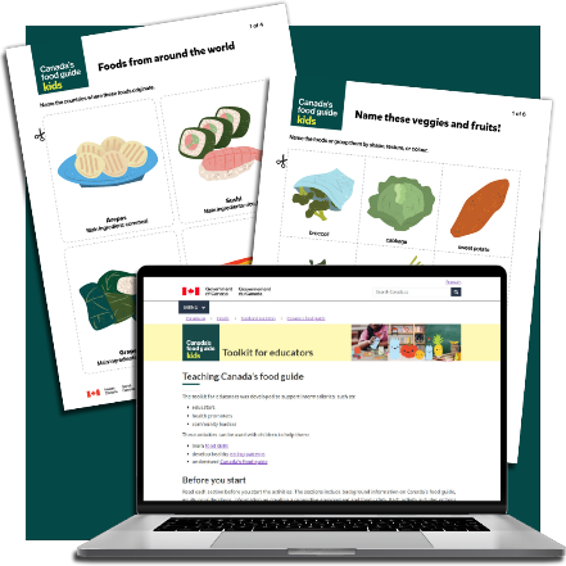Teachers play a big role in helping students develop food literacy. This can shape how they eat throughout their lives and affect their health and well-being. Like other areas of health education, schools need to create supportive learning environments and positive experiences for students to develop food literacy.
What is food literacy?
Food literacy includes the knowledge, skills, and attitudes that are learned and used across the lifespan to participate within a complex food environment. For example, it includes:
- Knowledge - knowing about food, like its ingredients, where it comes from, how it impacts health. This also includes understanding things that affect food choices, like culture and food traditions, income, how food is grown, processed and sold.
- Skills - having skills to prepare food, cook, and handle it safely
- Attitudes - having a positive attitude about food and eating
- Application - using this knowledge to make choices in the food environment that support health and well-being
To help students develop a good relationship with food and eating, and stay healthy, food literacy education should include:
- activities that are age-appropriate and that respect children’s and adults’ roles around food and eating
- supportive environments that promote positive food experiences
How to promote positive food experiences?
Every student has a unique set of food experiences that shape how they feel about food and what they like to eat. Schools can help students have positive food experiences by:
- creating a non-judgmental space
- encouraging students to use their senses and imagination to explore new foods
- establishing a relaxed and fun atmosphere, without applying pressure
- teaching age-appropriate skills to grow and prepare foods, and set up the space where they will eat
Having positive food experiences might help students try new foods and maybe even like them! They may need time to get accustomed to a new food (or may never), and that’s okay. Exploring different foods without feeling pressure to eat them can help them feel good about food and eating.
Canada’s food guide toolkit for educators
Canada’s food guide toolkit for educators is a free resource that promotes positive food experiences. Use this resource with your students to help them:
- understand Canada’s food guide
- explore foods and learn food skills
- develop eating habits that support health and well-being
 |
In the toolkit you’ll find:
- background information to help you prepare for activities. This section has information and tips on how to create a supportive environment for kids to learn about foods.
- activities that provide opportunities for kids to be exposed to a variety of vegetables and fruits, whole grain foods, and protein foods. The instructions are clear and detailed to help you save time. They include prep times, activity duration, material lists, instructions, and more.
- worksheets that are ready to print and easy to use.
